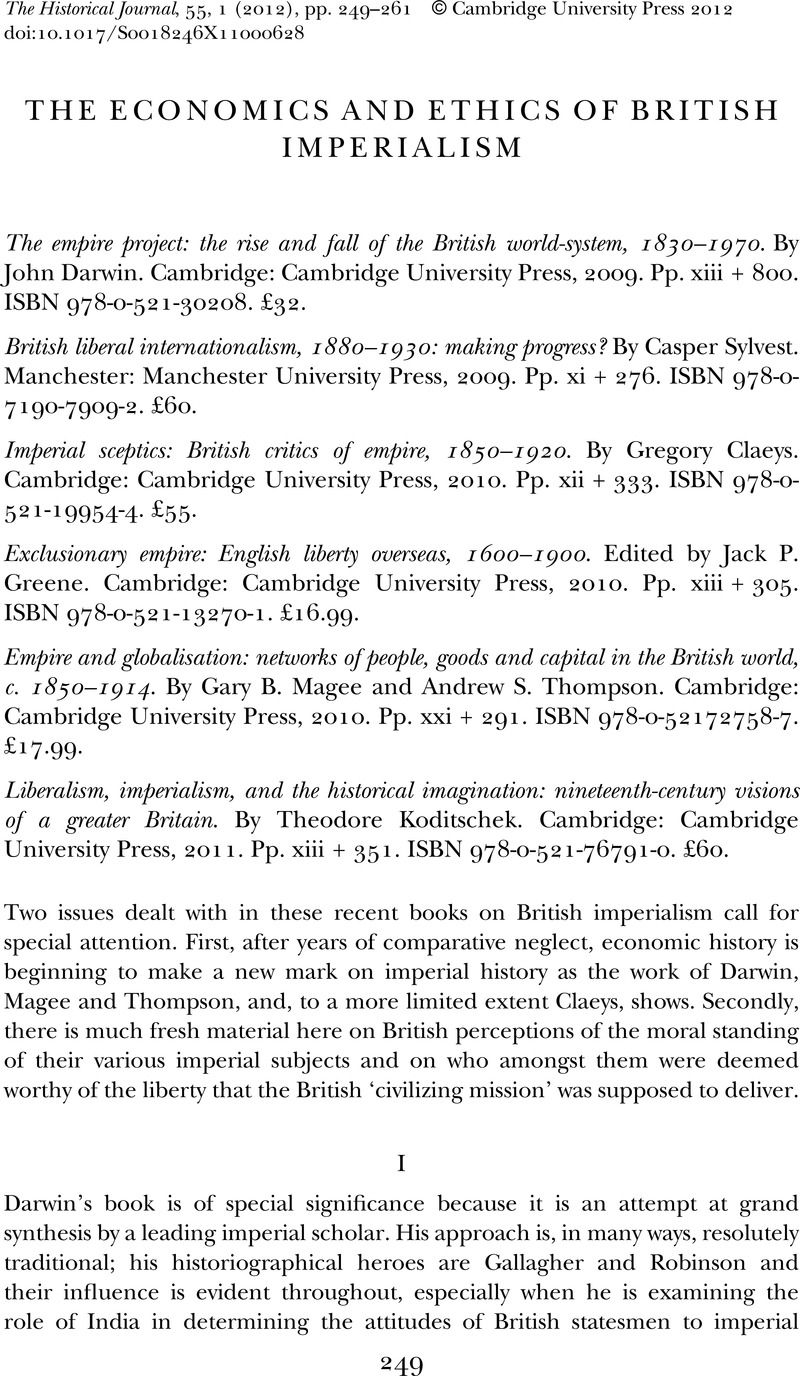Article contents
THE ECONOMICS AND ETHICS OF BRITISH IMPERIALISM
Published online by Cambridge University Press: 10 February 2012
Abstract

- Type
- Review Articles
- Information
- Copyright
- Copyright © Cambridge University Press 2012
References
1 Gallagher, J. A. and Robinson, R. E., ‘The imperialism of free trade, 1815–1914’, Economic History Review, 6 (1953–4), pp. 1–15CrossRefGoogle Scholar; Robinson, Ronald and Gallagher, Jack, Africa and the Victorians: the official mind of British imperialism (London, 1961)Google Scholar; Gallagher, J. A., The decline, revival and fall of the British empire (Cambridge, 1982)CrossRefGoogle Scholar.
2 Cain, P. J. and Hopkins, A. G., British imperialism, 1688–2000 (2nd edn, London, 2001)Google Scholar.
3 Smith, Adam, An inquiry into the nature and causes of the wealth of nations (2 vols., Oxford, 1976), ii, p. 947.Google Scholar
4 This is true of his earlier work: Darwin, John, After Tamerlane: the rise and fall of global empires (London, 2007)Google Scholar. See also Colley, Linda, Captives: Britain, empire and the world, 1600–1850 (London, 2002)Google Scholar.
5 See here Smith, Andrew, British businessmen and Canadian confederation: constitution making in an era of Anglo-globalization (Montreal, 2008)Google Scholar.
6 Belich, James, Replenishing the earth: the settler revolution and the rise of the Anglo-world, 1783–1939 (Oxford, 2009)CrossRefGoogle Scholar.
7 See also Dilley, Andrew, ‘Empire and risk: Edwardian financiers, Australia and Canada, c. 1899–1914’, Business and Economic History, 7 (2009), pp. 1–12Google Scholar; idem, ‘“The rules of the game”: London finance, Australia and Canada, c. 1900–1914’, Economic History Review, 63 (2010), pp. 1003–31Google Scholar.
8 Sylvest's work here needs supplementing with Trentmann, Frank, Free trade nation: commerce, consumption, and civil society in modern Britain (Oxford, 2008)Google Scholar, ch. 5.
9 Fears, J. Rufus, ed., Selected writings of Lord Acton (3 vols., Indianapolis, IN, 1988), iii, p. 582Google Scholar.
10 Bell, Duncan, The idea of Greater Britain: empire and the future of world order (Princeton, NJ, 2007)CrossRefGoogle Scholar.
11 Gallie, W. B., ‘Essentially contested concepts’, Proceedings of the Aristotelian Society, 56 (1956), pp. 167–98CrossRefGoogle Scholar.
12 On Maine see Mantena, Karuna, Alibis of empire: Henry Maine and the ends of liberal imperialism (Princeton, NJ, 2009)Google Scholar.
13 See here Gilmour, Robin, The ruling caste: imperial lives in the Victorian raj (London, 2005)Google Scholar.
14 Cain, P. J.,‘Empire and the languages of character and virtue in late Victorian and Edwardian Britain’, Modern Intellectual History, 4 (2007), pp. 1–25CrossRefGoogle Scholar.
15 On this theme see Weaver, John C., The great land rush and the making of the modern world, 1650–1900 (Montreal, 2003)Google Scholar.
16 Cain, P. J., Hobson and imperialism: radicalism, new liberalism and finance, 1887–1938 (Oxford, 2002)CrossRefGoogle Scholar; idem, ‘Radicalism, Gladstone and the liberal critique of Disraelian “imperialism”’, in Duncan Bell. ed., Victorian visions of global order: empire and international relations in nineteenth-century political thought (Cambridge, 2007), pp. 215–38Google Scholar.
17 Porter, Bernard, Critics of empire: British radical attitudes to colonialism in Africa, 1895–1914 (Cambridge, 1968)Google Scholar.
18 Hobson, John M. and Tyler, Colin, Selected writings of John A. Hobson, 1932–1938 (London, 2011), pp. 3–59Google Scholar.
19 The clearest brief statement is in Hobson, J. A., ‘Free trade and foreign policy’, Contemporary Review, 74 (1898), pp. 167–80Google Scholar.
20 See Pitts, Jennifer, A turn to empire: the rise of liberal imperialism in Britain and France (Princeton, NJ, 2005)CrossRefGoogle Scholar.
21 Jackson, Ashley, ‘Empire and beyond: the pursuit of overseas national interests in the late twentieth century’, English Historical Review, 122 (2007), pp. 1350–66CrossRefGoogle Scholar.
- 1
- Cited by


